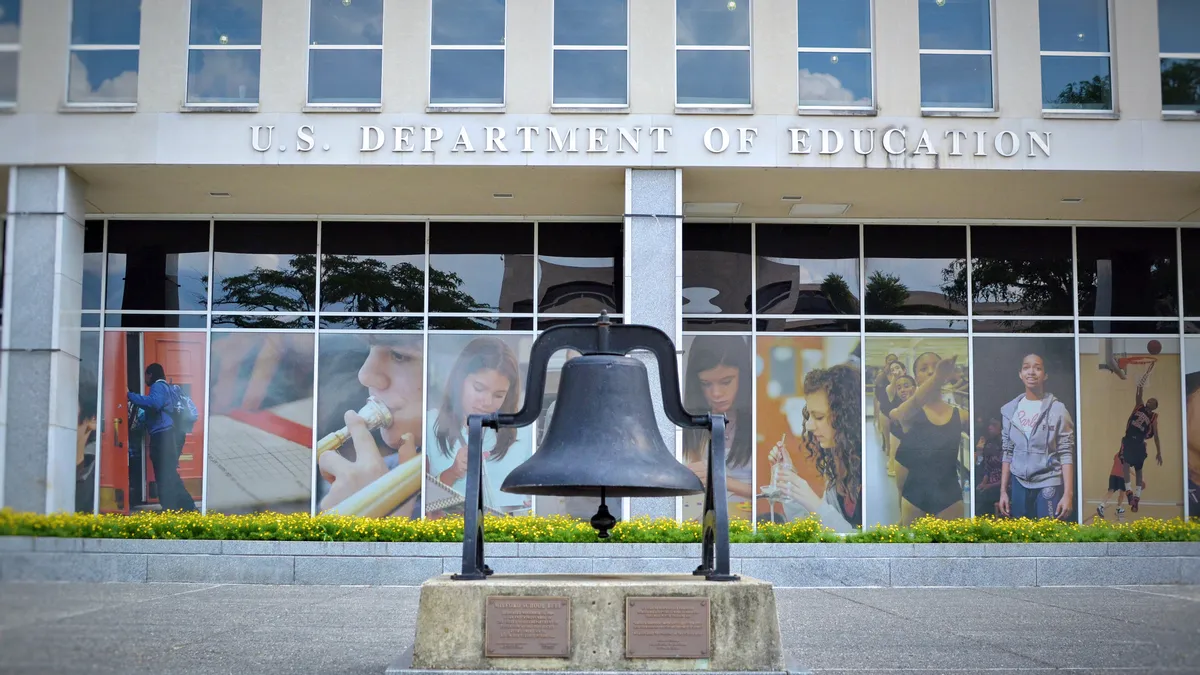Five states and a handful of advocacy groups sued over the Biden administration’s new Title IX regulations on Monday in two lawsuits that seek to block the rule from taking effect this August and instead keep the Trump-era version in place.
Led by Alabama, a collection of advocacy groups and three other states — Georgia, Florida and South Carolina — filed one lawsuit against the regulations, which govern how colleges must investigate and punish sexual violence. The state of Texas filed the other.
Title IX bans sex-based discrimination at federally funded colleges and K-12 schools. But both lawsuits take issue with new protections that the Biden administration’s rule provides for LGBTQ+ students.
The Alabama-led lawsuit also alleges that the regulations undermine the due process rights of students accused of sexual misconduct. And it argues that the new regulations clash with state laws, including those that bar transgender students from using bathrooms that align with their gender identities.
The two lawsuits kick off a legal battle between the U.S. Department of Education and groups that say the final rule oversteps the agency’s authority. And even more Title IX lawsuits could be coming down the pike — especially when the department releases a forthcoming Title IX rule specifically governing athletics.
“I am pleased to be among the first to challenge this ill-conceived rule that would infringe on the constitutional rights of students, parents, faculty, and the State of Alabama itself,” Alabama Attorney General Steve Marshall said in a statement Monday.
An Education Department spokesperson said via email Tuesday that the agency does not comment on pending litigation.
“The Department crafted the final Title IX regulations following a rigorous process to give complete effect to the Title IX statutory guarantee that no person experiences sex discrimination in federally-funded education,” the spokesperson said. “As a condition of receiving federal funds, all federally-funded schools are obligated to comply with these final regulations.”
Attacks on LGBTQ+ protections
The Biden administration’s Title IX rule expands the civil rights law’s protections by prohibiting discrimination based on gender identity and sexual orientation. Advocacy groups and Democratic lawmakers praised the increased LGBTQ+ protections when the Education Department debuted the rule’s text in mid-April. The rule was officially published in the Federal Register on Monday.
“By expanding the critical protections under this law, the new regulations would help ensure that all students, including LGBTQI+ students, are fully protected from discrimination based on sex, sexual orientation, and gender identity,” Rep. Bobby Scott, a Democrat from Virginia and the ranking member of the House’s education committee, said in a statement earlier this month.
In the preamble to the new regulations, the Education Department cited a landmark U.S. Supreme Court case, Bostock v. Clayton County.
In that 6-3 decision, handed down in 2020, the top court found that the sex-based protections under Title VII employment law prohibit employers from discriminating against workers because they are gay or transgender.
Some courts have applied the reasoning in Bostock to Title IX. The 9th U.S. Circuit Court of Appeals, for instance, held in 2023 in a case involving the University of Arizona that Title IX protects against harassment based on someone’s perceived sexual orientation.
But Monday's lawsuits disagree with this interpretation. They noted that the Supreme Court said in its Bostock ruling that the decision did not answer questions about whether it should be applied to federal laws beyond Title VII.
“It’s clear that the Department is trying to inject, for the first time, gender ideology into Title IX, contrary to longstanding practice and the statute’s original public meaning,” the Alabama-led lawsuit argued.
Due process concerns
The Alabama-led lawsuit asserts that the new Title IX rule will discard key due process protections in sexual misconduct cases. Conservatives and some advocacy groups have taken issue with several changes that the new regulations make, including bringing back the single-investigator model.
The controversial process allows a single person to investigate a sexual misconduct case and determine the outcome.
The Trump-era version of Title IX regulations, which took effect in 2020, barred colleges from using this method. But the Biden administration reinstated this option in the final rule after hearing that some underresourced colleges had difficulty maintaining the two separate roles of investigator and decision-maker.
The Alabama-led lawsuit argued that the single-investigator model has been “almost universally condemned,” citing a recent announcement from the American Civil Liberties Union opposing this part of the final rule. In the same statement, ACLU did also praise the rule’s LGBTQ+ protections.
The Alabama-led complaint also takes issue with several other regulatory changes, including repealing the requirement to hold live hearings.
“Under the 2020 rule, students accused of Title IX misconduct had the right to defend themselves in person,” the lawsuit states. “Now, their colleges or universities have full discretion whether to deny requests for in-person hearings, and thus meaningful cross-examination.”
The lawsuit also argues that the rule's definition of harassment raises free speech concerns.
The regulation defines harassment as “unwelcome sex-based conduct” that is “subjectively and objectively offensive and is so severe or pervasive” that it limits or prevents someone from participating in an educational program.
The lawsuit argues that this could cover “single instances of speech,” thus endangering students’ First Amendment rights.
“Under the new rule, students can be reported for merely expressing their opinions about controversial political and social issues of the day or even if they prefer not to use someone’s ‘preferred pronouns’ or other ‘gender-affirming’ language,” Cherise Trump, executive director of Speech First — one of the plaintiffs in the Alabama-led lawsuit — said in a statement. “This is compelled speech, and it is unconstitutional.”























